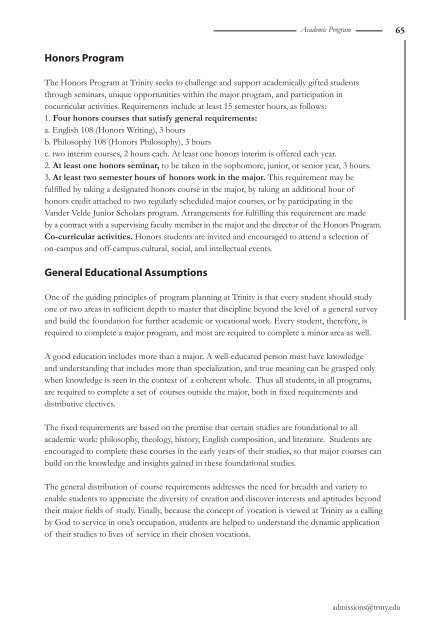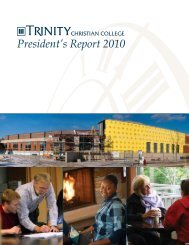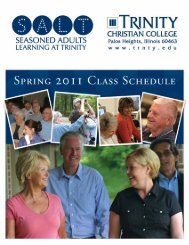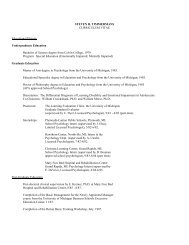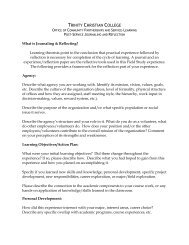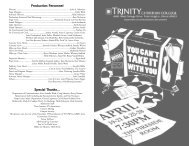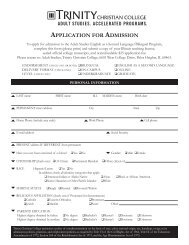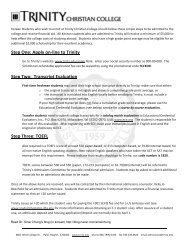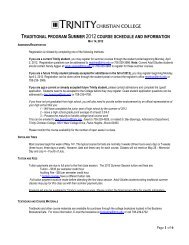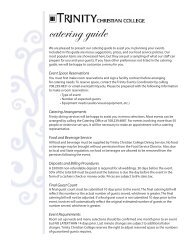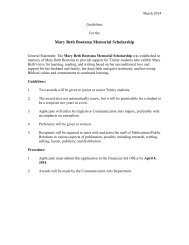College's catalog - Trinity Christian College
College's catalog - Trinity Christian College
College's catalog - Trinity Christian College
You also want an ePaper? Increase the reach of your titles
YUMPU automatically turns print PDFs into web optimized ePapers that Google loves.
Academic Program<br />
65<br />
Honors Program<br />
The Honors Program at <strong>Trinity</strong> seeks to challenge and support academically gifted students<br />
through seminars, unique opportunities within the major program, and participation in<br />
cocurricular activities. Requirements include at least 15 semester hours, as follows:<br />
1. Four honors courses that satisfy general requirements:<br />
a. English 108 (Honors Writing), 3 hours<br />
b. Philosophy 108 (Honors Philosophy), 3 hours<br />
c. two interim courses, 2 hours each. At least one honors interim is offered each year.<br />
2. At least one honors seminar, to be taken in the sophomore, junior, or senior year, 3 hours.<br />
3. At least two semester hours of honors work in the major. This requirement may be<br />
fulfilled by taking a designated honors course in the major, by taking an additional hour of<br />
honors credit attached to two regularly scheduled major courses, or by participating in the<br />
Vander Velde Junior Scholars program. Arrangements for fulfilling this requirement are made<br />
by a contract with a supervising faculty member in the major and the director of the Honors Program.<br />
Co-curricular activities. Honors students are invited and encouraged to attend a selection of<br />
on-campus and off-campus cultural, social, and intellectual events.<br />
General Educational Assumptions<br />
One of the guiding principles of program planning at <strong>Trinity</strong> is that every student should study<br />
one or two areas in sufficient depth to master that discipline beyond the level of a general survey<br />
and build the foundation for further academic or vocational work. Every student, therefore, is<br />
required to complete a major program, and most are required to complete a minor area as well.<br />
A good education includes more than a major. A well-educated person must have knowledge<br />
and understanding that includes more than specialization, and true meaning can be grasped only<br />
when knowledge is seen in the context of a coherent whole. Thus all students, in all programs,<br />
are required to complete a set of courses outside the major, both in fixed requirements and<br />
distributive electives.<br />
The fixed requirements are based on the premise that certain studies are foundational to all<br />
academic work: philosophy, theology, history, English composition, and literature. Students are<br />
encouraged to complete these courses in the early years of their studies, so that major courses can<br />
build on the knowledge and insights gained in these foundational studies.<br />
The general distribution of course requirements addresses the need for breadth and variety to<br />
enable students to appreciate the diversity of creation and discover interests and aptitudes beyond<br />
their major fields of study. Finally, because the concept of vocation is viewed at <strong>Trinity</strong> as a calling<br />
by God to service in one’s occupation, students are helped to understand the dynamic application<br />
of their studies to lives of service in their chosen vocations.<br />
admissions@trnty.edu


